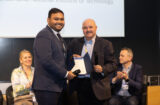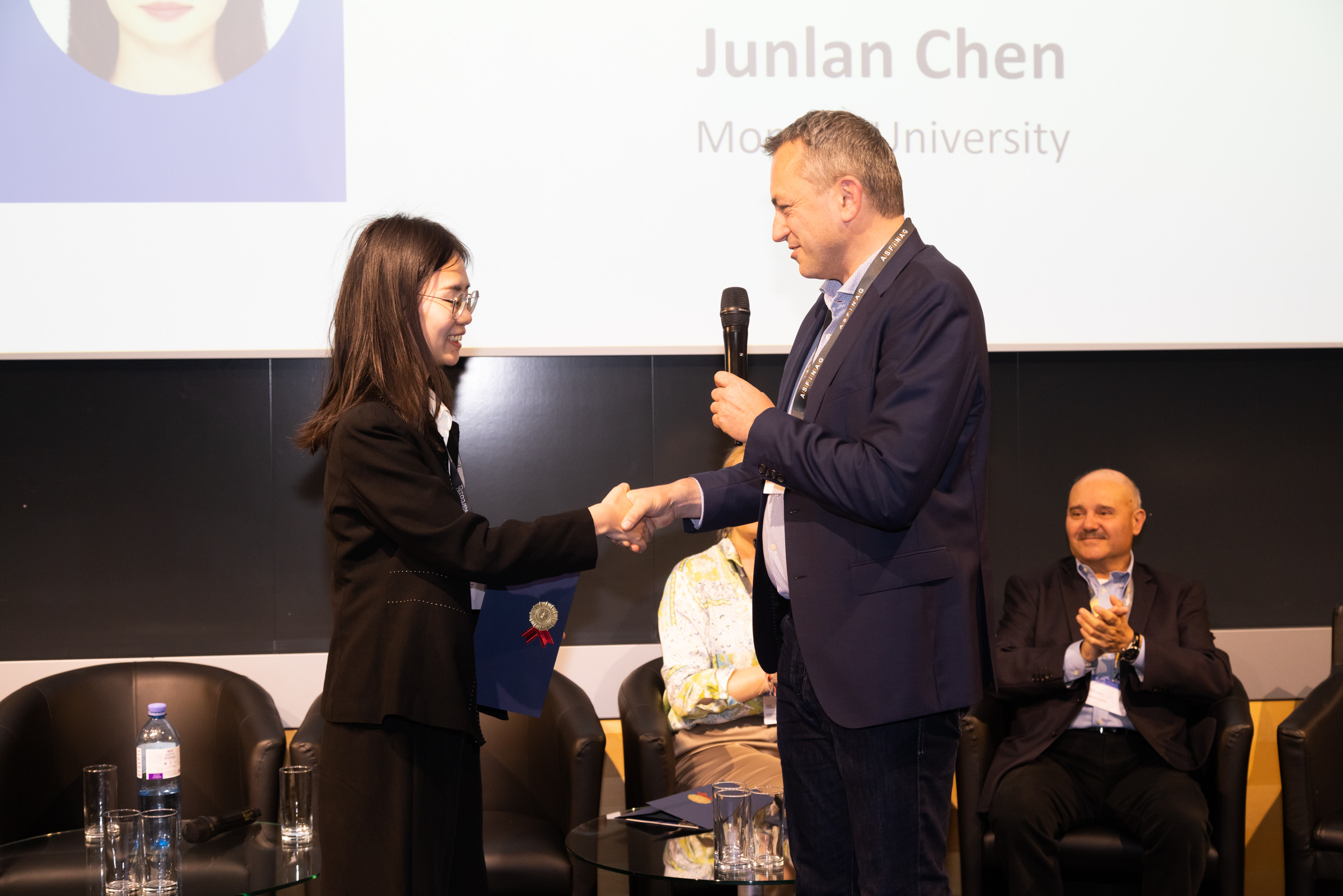- TM2.0
- TM2.0 Task Forces
- News
- Events
- Blog
- Library
- Members
- Contact Us
Meet the winners of the TM 2.0 Student Paper Awards at ISFO 2023: Junlan Chen
Dr Junlan Chen is the third winner of the TM 2.0 sponsored Student Paper Awards, which rewarded the work of student researchers in the field of traffic management. The competition was organised during the ISFO Symposium 2023, which was held on 26-30 June in Vienna, Austria, co-organised by TM 2.0 in collaboration with the Transportation Research Board (TRB) and AustriaTech. This key event brought together close to 400 traffic management experts from both the public and the private sector in Europe and the United States, including US Departments of Transport (DoTs) and the US academic community, to discuss the future of traffic management. The papers submitted as part of the competition were reviewed by the Student Paper Awards Committee, which comprises Panos D. Prevedouros (University of Hawaii/TRB), Martin Russ (AustriaTech/TM 2.0), Jop Spoelstra (Technolution/TM 2.0), Dr Johanna Tzanidaki (ERTICO/TM 2.0/TRB), Haizhong Wang (Oregon State University/TRB), and Yinhai Wang (University of Washington/TRB).
 Dr Junlan Chen is a Joint-Ph.D. of School of Transportation, Southeast University and Department of Civil Engineering, Monash University. She received her B.S. and M.S. degrees in Transportation Engineering in 2018 and 2020 respectively at Southeast University, China. Her research interests include transportation data science, data generation and public transportation.
Dr Junlan Chen is a Joint-Ph.D. of School of Transportation, Southeast University and Department of Civil Engineering, Monash University. She received her B.S. and M.S. degrees in Transportation Engineering in 2018 and 2020 respectively at Southeast University, China. Her research interests include transportation data science, data generation and public transportation.The paper she submitted achieved the third place of the Student Paper Awards at ISFO. Together with her co-authors, Dr Junlan Chen tackled imbalanced crash data that can negatively affects the performance of data-driven methods. Traditional data resampling methods are often not suitable as they only handle continuous variables and neglect the correlation between risk factors. To address this, the paper proposes a novel approach that adopts a deep generative model based on Conditional Tabular Generative Adversarial Networks (CTGAN) to create synthetic crash data. The study indicates that CTGAN-RU is comparable to other resampling methods, with the generated data showing consistent prediction accuracy and statistical inference.
Dr Junlan Chen talked to TM 2.0 and delved deeper into the transportation challenges she aspires to address by studying traffic engineering and the potential of generative AI to create traffic models.
- Why are you studying traffic engineering?
“I am studying traffic engineering because I firmly believe that the future of transportation lies in harnessing the potential of big data and generative AI to create smarter and more efficient transportation systems. As the transportation industry becomes increasingly reliant on data-driven solutions, my interest in traffic engineering stems from the desire to be at the forefront of this transformative era.
In this age of smart transportation, it is evident that the availability of diverse and rare traffic scenarios is crucial to developing accurate traffic models and effective transportation management strategies. However, many critical traffic situations remain scarce, leading to small sample data. I am passionate about addressing this challenge by exploring the applications of generative AI in generating additional small sample data to enhance the accuracy and reliability of traffic models.
By studying traffic engineering, I aspire to contribute to the advancement of transportation systems, specifically in the areas of traffic safety, mobility, and efficiency. Through my research, I aim to explore the potential of generative AI to create personalised mobility solutions that cater to individual commuters’ needs while promoting sustainability and seamless transportation experiences.
Ultimately, my pursuit of traffic engineering is driven by a vision of creating a future where transportation is not only data-driven but also smarter, safer, and more accessible for all. I am committed to making a positive impact on the field by leveraging the power of big data and generative AI to transform the way we manage and experience transportation in the modern world.”
- What is your vision for the future of mobility?
“In envisioning the future of mobility, it becomes evident that it will heavily rely on the era of big data, ushering in the era of “Smart Transportation.” While numerous sensors and mobile devices will collect vast amounts of data, it is important to recognise that critical traffic data for certain key scenarios remains scarce, leading to a phenomenon known as small sample data. These small sample data scenarios include, but are not limited to, severe traffic accidents, safety testing for autonomous vehicles, and other critical traffic situations. The lack of sufficient data in these situations poses challenges in building accurate traffic models that are purely data driven.
To address this issue, the development of intelligent systems capable of generating additional small sample data is paramount. By harnessing generative AI, we can effectively augment the existing data pool, allowing for a more comprehensive and representative dataset. This augmentation will lead to enhanced accuracy and reliability of traffic models and consequently improve traffic management. By generating diverse and rare traffic scenarios, we can test and validate transportation models under conditions that would otherwise be difficult to encounter in real-world scenarios. This approach fosters a more robust understanding of the transportation system’s dynamics, ultimately leading to the development of more effective and resilient transportation management strategies.
In conclusion, the future of mobility lies in leveraging big data and embracing the potential of generative AI to address the challenge of scarce small sample data. By doing so, we can propel transportation into an era of smart and efficient systems that cater to the diverse needs of individuals and create sustainable and seamless transportation solutions for tomorrow’s world.”
- What does the award mean to you?
“I am truly grateful to the committee for establishing the Student Paper Award, which demonstrates their unwavering support and encouragement towards young transportation scholars like myself. This award acts as a bridge, connecting my academic research in China and Australia with the rest of the world, and vice versa.
It inspires me a lot to be more confident and determined to contribute further in the field of generative AI for small sample traffic data. My specific research topic revolves around harnessing the power of generative AI to create diverse and rare traffic scenarios. As a researcher, I firmly believe that our work holds immense promise in shaping the future of transportation management. By generating a diverse range of critical traffic scenarios, we can better prepare transportation systems for unforeseen events and ensure safer traffic and better decision-making in traffic management.
In the end, I would like to extend my deepest appreciation to my supervisor for playing a crucial role in shaping my research journey to this award. Working alongside my supervisor has been an enriching experience, and I am profoundly grateful for their guidance and unwavering belief in my capabilities.”
The TM 2.0 Innovation Platform on interactive Traffic Management wishes Junlan Chen the best of success and looks forward to hearing more about his future work!
 ERTICO Partnership Activities We use cookies on our website to give you the most relevant experience by remembering your preferences and repeat visits. By clicking “Accept”, you consent to the use of ALL the cookies. However you may visit Cookie Settings to provide a controlled consent.Manage consent
ERTICO Partnership Activities We use cookies on our website to give you the most relevant experience by remembering your preferences and repeat visits. By clicking “Accept”, you consent to the use of ALL the cookies. However you may visit Cookie Settings to provide a controlled consent.Manage consentPrivacy Overview
This website uses cookies to improve your experience while you navigate through the website. Out of these, the cookies that are categorized as necessary are stored on your browser as they are essential for the working of basic functionalities of the website. We also use third-party cookies that help us analyze and understand how you use this website. These cookies will be stored in your browser only with your consent. You also have the option to opt-out of these cookies. But opting out of some of these cookies may affect your browsing experience.Necessary cookies are absolutely essential for the website to function properly. These cookies ensure basic functionalities and security features of the website, anonymously.
Cookie Duration Description cookielawinfo-checbox-analytics 11 months This cookie is set by GDPR Cookie Consent plugin. The cookie is used to store the user consent for the cookies in the category "Analytics". cookielawinfo-checbox-functional 11 months The cookie is set by GDPR cookie consent to record the user consent for the cookies in the category "Functional". cookielawinfo-checbox-others 11 months This cookie is set by GDPR Cookie Consent plugin. The cookie is used to store the user consent for the cookies in the category "Other. cookielawinfo-checkbox-necessary 11 months This cookie is set by GDPR Cookie Consent plugin. The cookies is used to store the user consent for the cookies in the category "Necessary". cookielawinfo-checkbox-performance 11 months This cookie is set by GDPR Cookie Consent plugin. The cookie is used to store the user consent for the cookies in the category "Performance". viewed_cookie_policy 11 months The cookie is set by the GDPR Cookie Consent plugin and is used to store whether or not user has consented to the use of cookies. It does not store any personal data. Functional cookies help to perform certain functionalities like sharing the content of the website on social media platforms, collect feedbacks, and other third-party features.
Performance cookies are used to understand and analyze the key performance indexes of the website which helps in delivering a better user experience for the visitors.
Analytical cookies are used to understand how visitors interact with the website. These cookies help provide information on metrics the number of visitors, bounce rate, traffic source, etc.
Advertisement cookies are used to provide visitors with relevant ads and marketing campaigns. These cookies track visitors across websites and collect information to provide customized ads.
Other uncategorized cookies are those that are being analyzed and have not been classified into a category as yet.
- Events










